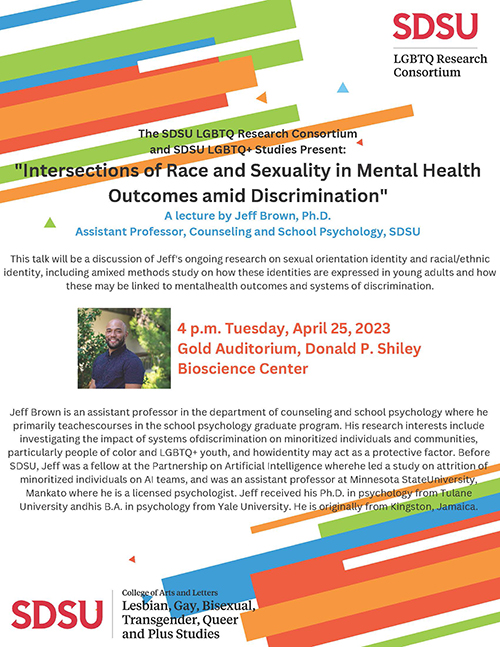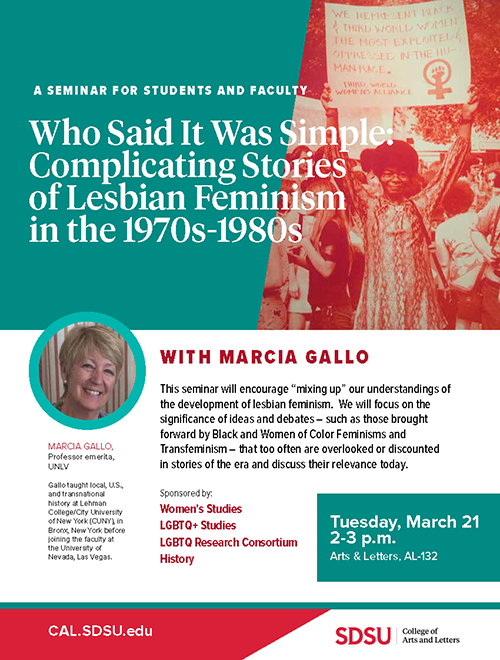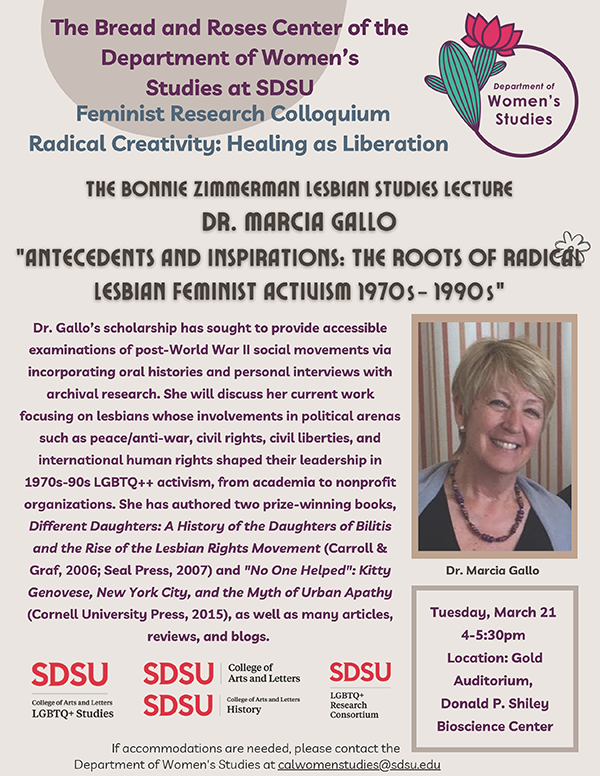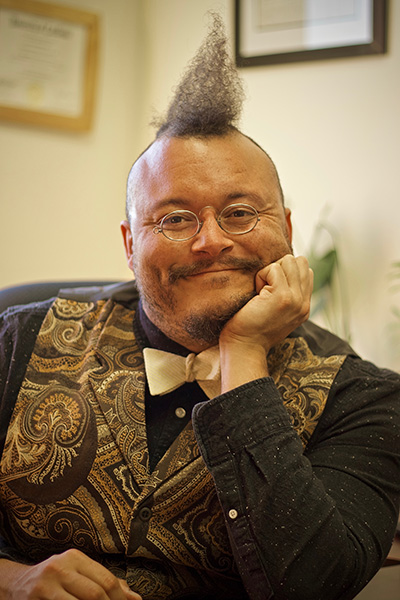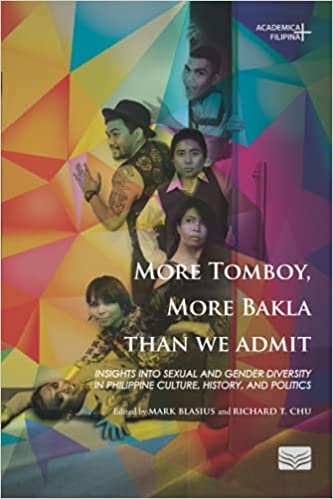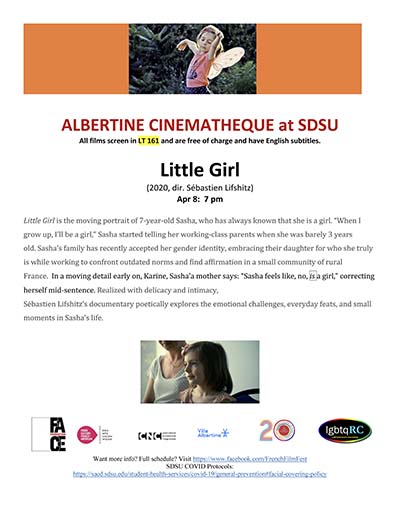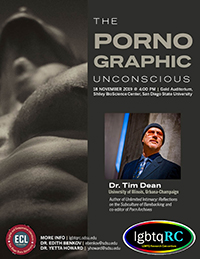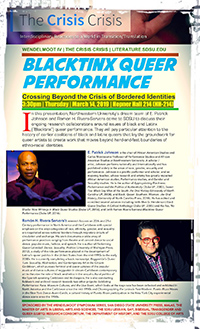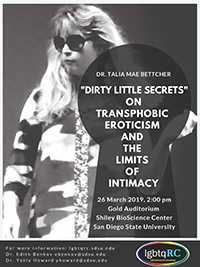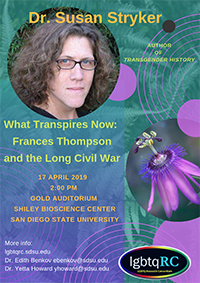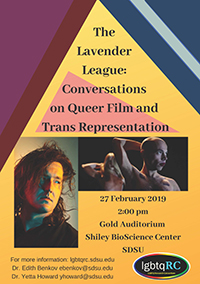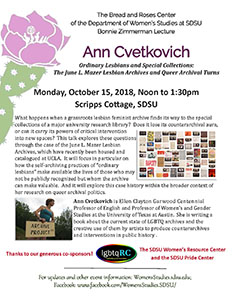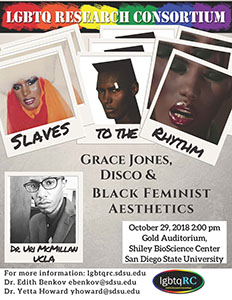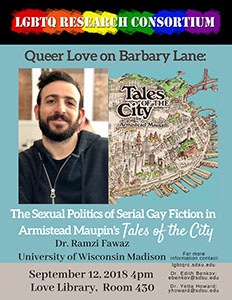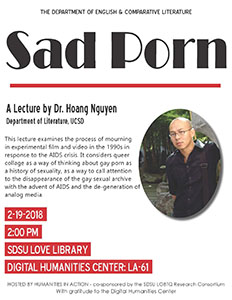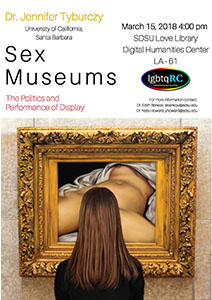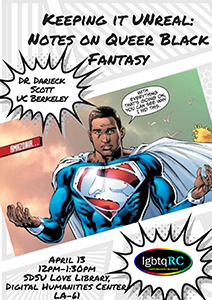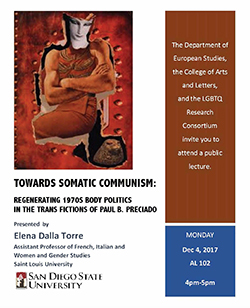
News and Events
To stay updated, please "like" our Facebook page.
Intersections of Race and Sexuality in Mental Health Outcomes amid Discrimination
A lecture by Jeff Brown, Ph.D.
Tuesday, April 25
4:00 p.m.
Gold Auditorium, Donald P. Shiley Bioscience Center
This talk will be a discussion of Jeff's ongoing research on sexual orientation identity and racial/ethnic identity, including a mixed methods study on how these identities are expressed in young adults and how these may be linked to mental health outcomes and systems of discrimination.
Jeff Brown is an assistant professor in the department of counseling and school psychology where he primarily teaches courses in the school psychology graduate program. His research interests include investigating the impact of systems of discrimination on minoritized individuals and communities, particularly people of color and LGBTQ+ youth, and how identity may act as a protective factor. Before SDSU, Jeff was a fellow at the Partnership on Artificial Intelligence where he led a study on attrition of minoritized individuals on AI teams, and was an assistant professor at Minnesota State University, Mankato where he is a licensed psychologist. Jeff received his Ph.D. in psychology from Tulane University and his B.A. in psychology from Yale University. He is originally from Kingston, Jamaica.
Sponsored by the LGBTQ Research Consortium and LGBTQ+ Studies
Who Said It Was Simple: Complicating Stories of Lesbian Feminism in the 1970s-1980s
A seminar for students and faculty with Marcia Gallo
Tuesday, March 21, 2023
2-3 p.m.
Arts & Letters (AL) 132
This seminar will encourage “mixing up” our understandings of the development of lesbian feminism. We will focus on the significance of ideas and debates – such as those brought forward by Black and Women of Color Feminisms and Transfeminism – that too often are overlooked or discounted in stories of the era and discuss their relevance today.
Marcia Gallo, Professor emerita, UNLV
Gallo taught local, U.S., and transnational history at Lehman College/City University
of New York (CUNY), in Bronx, New York before joining the faculty at the University
of Nevada, Las Vegas.
Sponsored by the LGBTQ Research Consortium, LGBTQ+ Studies, Department of Women's Studies, and Department of History.
Antecedents and Inspirations: The Roots of Radical Lesbian Feminist Activism 1970s- 1990s
The Bonnie Zimmerman Lesbian Studies Lecture with Dr. Marcia Gallo
Part of the Feminist Research Colloquium - Radical Creativity: Healing as Liberation
Tuesday, March 21, 2023
4-5:30 p.m.
Gold Auditorium, Donald P. Shiley Bioscience Center
The poet Sappho was perhaps the most famous woman in the ancient Mediterranean. She was heralded as honey-voiced, the tenth Muse, and the female equivalent of Homer. Her poetry exhorted her love for other women, and it is thanks to Sappho that women who love other women are today called lesbians. Sappho hailed from the island of Lesbos, and thus was a Lesbian. The term initially denoted a geographical origin but today, thanks to Sappho, means much more. Despite her fame in antiquity, most of the corpus of Sappho’s poetry has been lost to the ravages of time, neglect, or, even worse, to willful destruction. Legend tells us that Sappho’s poetry was publicly burned on multiple occasions due to her licentiousness. In this lecture, we will explore the life and later legacy of the renown poet Sappho.
Dr. Gallo’s scholarship has sought to provide accessible examinations of post-World War II social movements via incorporating oral histories and personal interviews with archival research. She will discuss her current work focusing on lesbians whose involvements in political arenas such as peace/anti-war, civil rights, civil liberties, and international human rights shaped their leadership in 1970s-90s LGBTQ+ activism, from academia to nonprofit organizations. She has authored two prize-winning books, Different Daughters: A History of the Daughters of Bilitis and the Rise of the Lesbian Rights Movement (Carroll & Graf, 2006; Seal Press, 2007) and "No One Helped": Kitty Genovese, New York City, and the Myth of Urban Apathy (Cornell University Press, 2015), as well as many articles, reviews, and blogs.
Sponsored by the College of Arts and Letters, LGBTQ Research Consortium, LGBTQ+ Studies, Department of Women's Studies, and Department of History.
Past Events
Ukuphazama iNatali: Bringing Queer and Indigenous Studies Approaches to South African History and Beyond
A Lecture By: T.J. Tallie, University of San Diego
Tuesday, October 11, 2022 2:30-4 p.m.
Gold Auditorium, Donald P. Shiley Bioscience Center
How can critical Indigenous and queer theoretical approaches transform the way we think about colonial history in South Africa (and beyond)? If settler colonialism itself is presented as a form of orientation, of making a recognizable and inhabitable home space for European arrivals on indigenous land, then native peoples and their continued resistance can serve to ‘queer’ these attempted forms of order. In such circumstances, the customs, practices, and potentially the very bodies of indigenous peoples can become queer despite remaining ostensibly heterosexual in orientation and practice, as their existence constantly undermines the desired order of an emergent settler state.
T.J. Tallie (he/they) is an Associate Professor of African History at the University of San Diego. He specializes in comparative settler colonial, Indigenous, queer, and imperial history, with a focus in the late nineteenth century. They are the author of "Queering Colonial Natal: Indigeneity and the Violence of Belonging in Southern Africa." Tallie's current research examines the creation and maintenance of settler monogamy across the nineteenth-century Anglophone world in relation to indigenous social formations, including polygamy.
Sponsored by LGBTQ+ Studies, the LGBTQ Research Consortium, Department of Africana Studies, and Department of History.
From Fame to Flames: The Life and Legacy of the Lesbian Poet Sappho
A Lecture By: Walter D. Penrose, Jr.
Associate Professor, Department of History, San Diego State University
The Occasional Lectures Series, San Diego Mesa College
Friday, October 14, 12-2 p.m
The poet Sappho was perhaps the most famous woman in the ancient Mediterranean. She was heralded as honey-voiced, the tenth Muse, and the female equivalent of Homer. Her poetry exhorted her love for other women, and it is thanks to Sappho that women who love other women are today called lesbians. Sappho hailed from the island of Lesbos, and thus was a Lesbian. The term initially denoted a geographical origin but today, thanks to Sappho, means much more. Despite her fame in antiquity, most of the corpus of Sappho’s poetry has been lost to the ravages of time, neglect, or, even worse, to willful destruction. Legend tells us that Sappho’s poetry was publicly burned on multiple occasions due to her licentiousness. In this lecture, we will explore the life and later legacy of the renown poet Sappho.
Queer Spaces, Queer Faces: Unpacking Philippine LGBTIQA+ Culture, History, and Politics
Thursday April 28, from 4:00 to 6:00 PM, via Zoom
Register for this event.
What is “bakla?” How are “tomboy” or “gay,” “trans” and “bi” used and historically understood in the Philippines? Drawing upon their recently published anthology More Tomboy, More Bakla than We Admit: Insights into Sexual and Gender Diversity in Philippine Culture, History, and Politics (Vibal, 2021) three of its authors and co-editors discuss the creation of their book and their original work for it on a lively, interactive, and thought-provoking panel about these and other issues relevant to the Philippines and its diaspora, as well as to more global theorizing and activism. Edith Benkov, Professor Emerita of European Studies, San Diego State University, will serve as the discussion moderator.
Jennifer C. Josef earned her PhD in anthropology from the University of the Philippines, Diliman and has authored pioneering work in LGBTQ+ studies of the Philippines. Her recent work includes “Vernacular Self-representation in Filipino Gender Identities: The Bontoc Minamagkit” and “Non-prescribed Hormone Therapy among Transgenders in Baguio City and Benguet.” She is currently the chair of the Department of Anthropology, Sociology, and Psychology at the University of the Philippines, Baguio.
Richard T. Chu received his BA from Ateneo de Manila University and his PhD from the University of Southern California. His work focuses on the history of the Chinese and Chinese mestizos in the Philippines and of the different Chinese diasporic communities in the world. His book The Chinese and Chinese Mestizos of Manila: Family, Identity, and Culture 1860s-1930s was published by E.J. Brill in 2010. Richard is Five College Professor of History at the University of Massachusetts, Amherst.
Mark Blasius is Professor Emeritus of Political Science at the Graduate Center of the City University of New York. His research focuses on contemporary political thought and the politics of sexuality and gender across cultures. His books include Sexual Identities, Queer Politics and We are Everywhere: A Historical Sourcebook of Gay and Lesbian Politics, among others and he is currently working on a study of LGBTIQA+ issues as an arena for thinking and advocating for social justice around the world. Mark earned a PhD in political philosophy from Princeton University.
Sponsored by the SDSU LGBTQ+ Studies Program, the SDSU LGBTQ Research Consortium, and the Office of the Dean, College of Arts and Letters.
Please direct any questions about this event to Walter Penrose, Jr. [email protected]
Albertine Cinematheque at SDSU
All films screen in LT 161 and are free of charge and have English subtitles.
Little Girl (2020, dir. Sébastien Lifshitz)
Friday, April 8, 2022: 7 pm
Little Girl is the moving portrait of 7-year-old Sasha, who has always known that she is a girl. “When I grow up, I’ll be a girl,” Sasha started telling her working-class parents when she was barely 3 years old. Sasha’s family has recently accepted her gender identity, embracing their daughter for who she truly is while working to confront outdated norms and find affirmation in a small community of rural France. In a moving detail early on, Karine, Sasha’a mother says: “Sasha feels like, no, is a girl,” correcting herself mid-sentence. Realized with delicacy and intimacy,
Sébastien Lifshitz’s documentary poetically explores the emotional challenges, everyday feats, and small moments in Sasha’s life.
Want more info? Full schedule? Visit https://www.facebook.com/FrenchFilmFest
 AIDS and the Distribution of Crises
AIDS and the Distribution of Crises
2 March 2020 at 2:00 pm, Digital Humanities Center, Love Library, LA-61, SDSU
Drs. Jih-Fei Cheng and Alexandra Juhasz are editors, with Nishant Shahani, of the soon-to-be released AIDS and the Distribution of Crises (Duke University Press 2020) which establishes how the AIDS pandemic is a network of varied historical, overlapping, and ongoing crises born of global capitalism and colonial, racialized, gendered, and sexual violence. Engaging with AIDS activist and artist, Judy Ornelas Sisneros, this panel will present meaningful examples from the anthology, Sisneros’s ongoing work, and the archival art show, Metanoia: Transformation Through AIDS Art and Activism (at the ONE Archives Gallery in West Hollywood) with which all three panelists are involved. Drawing on their investments in activism, media, anticolonialism, feminism, and queer and trans of color critiques, the panelists will outline how the neoliberal logic of “crisis” structures how AIDS is aesthetically, institutionally, and politically reproduced and experienced.
Event co-sponsored by The Digital Humanities Initiative and SDSU Library; free and open to the public.
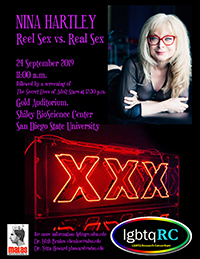
Nina Hartley | Reel Sex vs. Real Sex
24 September 2019
adult film entertainer, feminist porn pioneer, sex educator
followed by a screening of The Secret Lives of Adult Stars at 12:30 p.m.
co-sponsor: M.A.L.A.S. The Master of Arts in Liberal Arts and Sciences
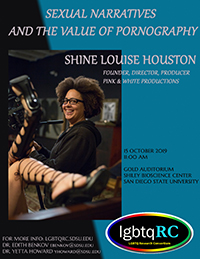
Shine Louise Houston | Sexual Narratives and the Value of Porn
15 October 2019
filmmaker, founding director/producer, Pink and White Productions queer pornography company
Dr. Tim Dean | The Pornographic Unconscious (University of Illinois, Urbana Champaign)
author of Unlimited Intimacy: Reflections on the Subculture of Barebacking and co-editor of Porn Archives
co-sponsor: Department of English & Comparative Literature
Blacktino Queer Performance
14 March 2019
E. Patrick Johnson and Ramón Rivera-Servera, Authors of Blacktino Queer Performance (Duke University Press)
Northwestern University
Blacktino Queer Performance approaches the interrelations of blackness and Latinidad through a stimulating mix of theory and art. The collection contains nine performance scripts by established and emerging black and Latina/o queer playwrights and performance artists, each accompanied by an interview and critical essay conducted or written by leading scholars of black, Latina/o, and queer expressive practices. Whether interrogating constructions of Latino masculinity, theorizing the black queer male experience, or examining black lesbian relationships, the contributors present Blacktino Queer Performance as an artistic, critical, political, and collaborative practice.
Co-sponsored with the Master of Arts in Liberal Arts & Sciences (MALAS) program and the Department of English and Comparative Studies, part of the Wendelmoot Symposium Series Spring 2019
“Dirty Little Secrets”: On Transphobic Eroticism and the Limits of Intimacy
26 March 2019
Dr. Talia Mae Bettcher, California State University, Los Angeles
Event is free and open to the public
In this talk, Bettcher theorizes the intermeshing of transphobic oppression with sexist and racist oppressions. Specifically, Bettcher considers the relations among “deceiver/pretender” representations, intimacy, labor, and law enforcement in transphobic eroticizations of trans women. While focusing on trans sex work, Bettcher also explores the general structural features that can undermine relationship formation for trans women.
What Transpires Now: Frances Thompson and the Long Civil War
17 April 2019
Dr. Susan Stryker, University of Arizona
author of Transgender History
Stryker explores the complex history and the intersections of race and gender in the life of Frances Thompson, a former slave, and one of the five black women whose testimony was heard before a congressional committee investigating the Memphis Riots (1866). Thompson as well as other freedwomen were attacked and raped during the riots. In 1876, Thompson was arrested for dressing in men's clothing.
The Lavender League: Conversations on Queer Film and Trans Representation
27 February 2019
Producer Luka Fisher will present a series of films that they have produced with directors Tristan Scott-Behrends and Matthew Kaundart and that feature visual and performance artist Daniel Crook -- these films explore themes of identity, sexuality, masculine femininity, and misogyny on grindr. Schedules permitting, Fisher will be joined by Scott-Behrends, Kaundart, and Crook. The conversation will continue with a presentation by Lyle Kash, who is the writer, director, and editor of Death and Bowling, a feature film about death, transformation, and grief made by an almost entirely trans cast and crew (T4T Productions).
Ordinary Lesbians and Special Collections: The June L. Mazer Lesbian Archives and Queer Archival Turns
Monday, October 15, 2018
Dr. Ann Cvetkovich, University of Texas, Austin
What happens when a grassroots lesbian feminist archive finds its way to the special collections of a major university research library? Does it lose its counterarchival aura, or can it carry its powers of critical intervention into new spaces? This talk explores these questions through the case of the June L. Mazer Lesbian Archives, which have recently been housed and catalogued at UCLA. It will focus in particular on how the self-archiving practices of “ordinary lesbians” make available the lives of those who may not be publicly recognized but whom the archive can make valuable. And it will explore this case history within the broader context of her research on queer archival politics.
Co-sponsored with the Department of Women's Studies
Slaves to the Rhythm: Grace Jones, Disco, and Black Feminist Aesthetics
29 October 2018
Dr. Uri McMillan, University of California, Los Angeles
This talk thinks through dance and black feminist aesthetics, principally engaging black women artists in the 1970s who engaged with various forms of dance--especially disco and funk--as pathways to new forms of being, thought, and aesthetics. In other words, how can we think of dance as a linchpin for a particular form of black feminist avant-garde aesthetics? And what emerges when we focus on the street, nightclub, and discoteque--rather than the museum--as the place where iconoclastic visual and performance paradigms emerged?
Centering on Grace Jones's commentary on disco in her recently published memoirs, I'll Never Write My Memoirs, this talk will also pivot out to consider conceptual artist Adrian Piper's writings on funk in New York City and Senga Nengudi's hybrid of sculpture and dance in Southern California in the 70s.
Queer Love on Barbary Lane: The Sexual Politics of Serial Gay Fiction in Armistead Maupin's Tales of the City
12 September 2018
Dr. Ramzi Fawaz, University of Wisconsin, Madison
In this talk, Fawaz analyzes the content and reading experience of Armistead Maupin’s Tales of the City, the most popular serialized gay fiction of the 1970s, which appeared in daily installments in the San Francisco Chronicle between 1976-1983. He argues that the serialized rhythm of the narrative—which followed the social and sexual misadventures of a cadre of queer friends in San Francisco’s Nob Hill neighborhood—modeled gay liberation’s conception of "coming out of the closet" about one’s sexuality as a process that unfolds over time through repeated encounters with new erotic possibilities. To provide evidence of this link between serial format and lived experience, Fawaz draws upon interviews he conducted with actual San Francisco readers of Maupin’s original text alongside close analysis of the rhetorical and literary forms of address that Maupin deployed to make "coming out" a widely accessible way of expressing one's sexual and social desires, regardless of one's specific sexual identity. Ultimately Fawaz shows the story's unfolding narrative about 1970s queer social life and the actual experience of reading it daily alongside other San Francisco residents helped disseminate the radical sexual politics of gay liberation to both gay and straight audiences through the very act of repeated reading, and on-going engagement with each character’s sexual awakenings.
Sad Porn
19 February 2018
Dr. Hoang Tan Nguyen, University of California, San Diego
In the 1980s, the AIDS pandemic wiped out a vibrant gay sexual culture established in the United States during the sexual revolution in the 1970s. Consequently, the trauma of AIDS is reflected in the preeminent site of gay male cultural production: gay video pornography. Critics noted the consumption of pornography (as material for masturbation) as the “safest” sex of all, and activists called for the use of condoms in porn videos as an important strategy of safer sex education. While these scholarly and activist responses have rightly focused on education and prevention, there have been few efforts made to register the affective dimension of AIDS and visual representation.
This presentation examines the process of mourning in experimental film and video in the 1990s in response to the AIDS crisis. Specifically, I consider queer collage as a way of thinking about gay porn as a history of sexuality, as a celebration of sexuality, but also a history of loss and sadness. Using the films of Robert Blanchon, Michael Brynntrup, and Charles Lofton, I argue that these works, by reusing found footage from 1970s and 1980s gay pornography, call attention to the disappearance of the gay sexual archive with the advent of AIDS and the de-generation of analog media. The reanimation of obsolete formats, including celluloid film and VHS video, in these found footage films constitute a witnessing and a memorialization of a lost sexual culture. I contend that these films demonstrate how personal porn archiving ensures the survival of public sexual histories and memories.
Co-sponsored event with English and Comparative Literature, Humanities in Action
Sex Museums: The Politics and Performance of Display
15 March 2018
Dr. Jennifer Tyburczy, University of California, Santa Barbara
All museums are sex museums. In Sex Museums, Jennifer Tyburczy takes a hard look at the formation of Western sexuality—particularly how categories of sexual normalcy and perversity are formed—and asks what role museums have played in using display as a technique for disciplining sexuality. Most museum exhibits, she argues, assume that white, patriarchal heterosexuality and traditional structures of intimacy, gender, and race represent national sexual culture for their visitors. Sex Museums illuminates the history of such heteronormativity at most museums and proposes alternative approaches for the future of public display projects, while also offering the reader curatorial tactics—what she calls queer curatorship—for exhibiting diverse sexualities in the twenty-first century.
Tyburczy shows museums to be sites of culture-war theatrics, where dramatic civic struggles over how sex relates to public space, genealogies of taste and beauty, and performances of sexual identity are staged. Delving into the history of erotic artifacts, she analyzes how museums have historically approached the collection and display of the material culture of sex, which poses complex moral, political, and logistical dilemmas for the Western museum. Sex Museums unpacks the history of the museum and its intersections with the history of sexuality to argue that the Western museum context—from its inception to the present—marks a pivotal site in the construction of modern sexual subjectivity.
Keeping It Unreal: Notes on Black Queer Fantasy
13 April 2018
Dr. Darieck Scott, University of California, Berkeley
“Keeping It Unreal: Notes on Black Queer Fantasy” theorizes how fantasies of black
power and triumph fashion theoretical, political and aesthetic challenges to—and respite
from—white supremacy and antiblackness. This talk is drawn from Scott's current project,
which examines representations of blackness in fantasy-infused genres: superhero comic
books, erotic comics, fantasy and science-fiction genre literature, as well as contemporary
literary “realist” fiction centering fantastic conceits.
These representations of black power are marked as fantastic because of their perceived
distance from material realities such as the pervasive endangerment of black people’s
lives, and large disparities between black and non-black populations in wealth and
the exercise of political power. But fantasy is also often analytically understood
in critical race scholarship as underwriting and sustaining blackness as the mark
of the abject: Blackness becomes a racial, existential, social and political category
via an imposition of fantasy on social reality; historically this facilitated the
creation of a class of readily identifiable slave labor, and blackness was crucial
in establishing a boundary-definition and status marker for the emerging “human” post-1492,
thus strengthening the (non-black) human’s claim to political citizenship in a global
world structured by the nation-state, capitalism, colonialism, and modernity. Racial
fantasy in these senses is a political tool of subjugation par excellence, efficiently
organizing political economies and social groupings, and seductively demanding that
all individuals and collectives take up racialized terms of self-definition as the
price of social belonging and of economic as well as psychic well-being.
While taking as true this account of the origins and functions of blackness and the part fantasy plays in its reproduction, this talk pursues the idea that fantasizing against antiblackness is highly significant, even if we cannot measure such fantasies’ effectiveness, and even though the wildest fantasy cannot free itself from the constraints of fantasizers’ immersion in a racialized “real” world. Scott wants to ask what kinds of incomplete un-doings, what kinds of work, even failed work, fantasies of powerful or triumphant blackness might do. A significant portion of fantasy’s usefulness, he will suggest, lies in its being a queer practice, or its working with the queer aspects of blackness.
Towards Somatic Communism: Regenerating 1970s Body Politics in the Trans Fictions of Paul B. Preciado
4 December 2017
Dr. Elena Dalla Torre (Assistant Professor of French, Italian and Women and Gender Studies at Saint Louis University)
Sponsored by the Department of European Studies, the College of Arts and Letters, and the LGBTQ Research Consortium.
Blake Little’s Photographs from the Gay Rodeo
September 1 to November 30
Experience the grit, determination, and tumbles of the gay rodeo circuit with this exhibition of photographs that explores a time-honored American tradition. Rendering the story in classic black-and-white imagery, Blake Little captures scenes of camaraderie, identity, and intimacy in an expansive redefinition of what a cowboy can be.
Film Country People and filmmaker
29 September 2016
Featuring: Dr. David Bobrow
Tom Davies LGBT Warrior: The Road to the Courtroom
5 October 2016
A Multifaceted View of Gender Identity that is Cis- and Trans*-Centered
12 October 2016
Featuring:
Dr. Charlotte Chucky Tate, San Francisco State University
"Base Camp": Irony, Gaiety, and Queer Environmental Performance
20 October 2016
Featuring: Dr. Nicole Seymour, California State University Fullerton
The Erotics of Artificiality
2 November 2016
Featuring: Dr. Yetta Howard, English and Comparative Literature Department, SDSU
Punk musician, author, educator, and feminist archivist Alice Bag
16 November 2016
Same-Sex Love and Desire among Muslim Women
11 Feb 2016
Prof. Huma Ghosh (Women's Studies)
Dr. Huma Ahmed-Ghosh is Professor and Chair of the Department of Women's Studies at San Diego State University. She is also on the Advisory Board of the Center for Islamic and Arabic Studies and the Center for Asia-Pacific Studies . Her research focuses on women in Afghanistan, Muslim immigrant women to the USA, and Islam and feminism.
Novelist Garth Greenwell (finalist for the Edmund White Award for Debut Fiction and the Lambda Literary Award for LGBT Fiction)
13 April 2016
LGBTQ Research Consortium Symposium: Queer Entanglements: Interdisciplinarity and LGBTQ Studies
29 April 2016
Featuring keynote lectures by Juana Maria Rodriguez, UC Berkeley and Anthony Ocampo, Cal Poly, Pomona
Invisible and Ambiguous Bodies: An Analysis of Asian Americans in Orange Is the New Black
Dr. Minjeong Kim (Department of Sociology, SDSU)
16 Sept 2015
In this presentation, I critically examine the two Asian American characters --Chang and Soso-- whose bodies are marginalized and ridiculed in the setting of women’s prison named Litchfield Penitentiary. Many mainstream films and television shows that have attempted to tackle racial issues or represented racial diversity have failed to present meaningful images of Asian Americans and perpetuated unflattering, stereotypical representations of Asian American characters. Despite both characters’ queerness--Chang’s androgyny or genderqueer, and Soso’s same-sex intimacy, this presentation argues that the show has yet to challenge racial images. The presentation discusses various issues related to Asian American images in popular culture, such as American orientalism, intersectionality, and representation of Asian American LGBTQ and interracial intimacy.
Young, Effeminate, and Strange: The Debut of Truman Capote
Dr. Jeff Solomon (Department of English, USC)
1 Oct 2-15
How did young Truman Capote, a gay writer who closeted neither his person nor his writing, succeed amidst the homophobia and censorship of 1947? This talk will explore how Capote vaulted himself into celebrity through a campaign of photographic self-representation that portrayed him as young, effeminate, and strange—a triad of broad queerness that both broadcasted and disguised Capote’s homosexuality and climaxed with the spectacular notoriety of the dust jacket of his first novel, Other Voices, Other Rooms.
"What’s Your Gaydar Telling You?": Untangling Gender and Sexual Orientation in Gaydar Research
Dr. Arianne Miller (Department of Counseling and School Psychology, SDSU)
29 Oct 2015
Over the past 30 years, “gaydar" has moved from being a popular in-group term used among LGBTQ communities, to a concept and phenomenon that is the focus of scientific study. This talk discusses recent findings and trends in gaydar research. Recent studies, for example, provide evidence that gaydar may exist, yet they also have the tendency to use gender nonconformity as a proxy for homosexuality and to use gaydar as a means of establishing homosexuality as a visually detectable identity. The talk will address how the research masks gender diversity among gay and straight individuals as well as reproduces traditional racialized archetypes of femininity and masculinity.
Conference: The Coming of Age of LGBTQ Studies: Past, Present, and Future Directions
April 17-18, 2015
The Consortium hosted a national conference at SDSU centered on LGBTQ research. The key note speaker was given by Dr. Karen Tongson (USC).
Nicaraguan LGBT History
5 May 2015
Dr. Victoria Gonzalez-Rivera
Professor Gonzalez-Rivera will talk about her latest book project, a co-authored account of Nicaragua’s LGBT history from the early twentieth century to the present. The lecture will address the tensions inherent in writing a book that documents the history of LGBT activism, as well as the lives of regular people who tried very hard to avoid being caught by the historical record.
Erotics of Disproportion: Suicide and the Golden Gate Bridge as Anti-Memorial
17 Feb 2015
Dr. Yetta Howard
This talk explores the Golden Gate Bridge as an unlikely memorial to the suicidal subjects who have jumped to their deaths from it. Building on the question of memorializing via bodily architectures and queer phenomenology, Howard turns to experimental documentary to theorize the erotic potentials of suicidal relationality.
Public Health Research on Substance Use in LGBT Populations
Dr. Heather Corliss
2 March 2015
Advances in public health research have led to the identification of disparities in unhealthy substance use and substance use disorders in lesbian, gay, bisexual and transgender populations compared to heterosexual cisgender populations. This presentation will summarize the major findings from this body of research, describe what we know about potential causes, and discuss the public health community's response to addressing these disparities.
Attitudes Toward Sexual Minorities: A Social Psychological Perspective
19 March 2015
Dr. Allison Vaughn
Research on attitudes toward sexual minorities reflects the multifaceted nature of attitudes as well as the diversity of this inclusive group. Attitudes contain cognitive (i.e., stereotypes), affective (i.e., prejudice), and behavioral (i.e., discrimination) components in both their formation and expression. This talk will focus on the use of two social psychological models to examine attitudes towards sexual minorities: the Stereotype Content Model and the Behaviors from Intergroup Affect and Stereotypes map.
Literature: A Case of White Supremacy
12 Nov 2014
Acclaimed novelist Michael Nava will discuss his new work The City of Palaces, a tale of interwoven lives: Miguel and Alicia; José, a boy as beautiful and lonely as a child in a fairy tale; the idealistic Francisco Madero, who overthrows Díaz but is nevertheless destroyed by the tyrant's political system; and Miguel's cousin Luis, shunned as a "sodomite." A glittering mosaic of the colonial past and the wealth of the modern age, The City of Palaces is a story of faith and reason, cathedrals and hovels, barefoot street vendors and frock-coated businessmen, grand opera and silent film, presidents and peasants, the living and the dead.
Sappho's Erased Sexuality: Lesbian Lyrics and Early Renaissance Humanism
11 Sept 2014
Lecture by Prof. Walter Penrose, History
Although Sappho was revered as the greatest woman poet of all time by the Greeks, in late antiquity and the Middle Ages, Sappho was vilified for her sexuality. In the initial stages of the Renaissance, however, humanists “rehabilitated” Sappho’s virtue in a Christian context where same-sex love was considered an “unmentionable” vice. In this context, Sappho's love for other women was simply not mentioned. Desperate times call for desperate measures: Sappho was perhaps the most famous and skilled woman who had ever lived, and her example was pivotal in the Humanist quest to improve the lot of women in the late medieval era, a time of extreme misogyny. At the apex of this effort, Sappho's skill was used to argue that women were better than men by Bartolommeo Goggio. Sappho was an extraordinarily gifted individual, the prototype "Lesbian," and, in Goggio's reading, a member of the "first sex."
We Were Never Meant to Survive: Coalition Building in Queer Times
25 Sept 2014
Lecture by Prof. Andreana Clay, Sociology, San Francisco State University
This talk focuses on the necessity of coalition building between the LGBTQ community and communities of color. These communities, often viewed as separate, ignore both the intersections of racialized and queer identities for queer people of color as well as the shared experiences of surveillance, violence, and loss. Prof. Clay's goal is to identify and understand these links in order to bridge and build strategies for coalition and social change.
Challenges and Opportunities in Studying the Longest "Legal" Same-Sex Couples in North America
Lecture by Prof. Esther Rothblum, Women's Studies
8 Oct 2014
In the year 2000, Vermont became the first state in the U.S. (and before any province of Canada) to legalize same-sex relationship in the form of civil unions (same-sex marriage would not be legal until 2005 in Massachusetts). This longitudinal study follows several hundred couples over time: same-sex couples who had civil unions in Vermont during the first year of that legislation, same-sex couples in their friendship circle who did not have civil unions, and heterosexual married siblings. The study focuses on couples who have since gotten married as well as those that have terminated their relationship, focusing on a number of demographic, psychological, and relationship variables.
The Queer Life of Diaspora: Race, Religion, and Resistance in Colorblind Europe
23 Oct 2014
Lecture by Prof. Fatima El-Tayeb, Literature, UCSD
This talk takes a comparative approach to processes of radicalization in order to both complicate US-centric readings of (post)raciality and to challenge notions of a colorblind Europe. Focusing on translocal queer of color activism across the continent, Prof. El-Tayeb traces racialized communities’ resistance to a system of neoliberal multiculturalism that is as present on the continent as in the US.
Queer Accents & Linguistic Identity
15 April 2014
Professor Doug Bigham (Linguistics)
Transnational Skype Conference Intersectionality and Advocacy in SOGI and LGBTQIA Communities
16 April 2014
Join us for a transnational Skype conference between San Diego State University and the University of the Witwatersrand, South Africa on intersectionality and advocacy in SOGI (Sexual Orientation and Gender Identity) and LGBTQIA communities. Through examining the intersectional nature of identities and communities, including the interlocking oppressions and systems of privilege embedded in them, we hope to better understand our differences as well as what unites us.
Documentary filmmaker Christie Herring
12 March 2104
Ms. Herring will screen her acclaimed film The Campaign, which focuses on the Proposition 8 campaign from the perspective of those working to prevent its passage. The screening will also include an opportunity for a question-and-answer discussion with Ms. Herring.
"An illness we catch from American women?": Lesbian Identities and Migration
8 April 2014
Professor Emeritus Oliva Espin
Why is there Same-Sex Marriage in Argentina? A Comparative Analysis of Recent History of Sexuality and LGBT politics in Latin America and the United States
5 March 2014
Professor Pablo Ben (History)
Dr. Anna Muraco, from Loyola Marymount University (Sociology)
13 February 2014
Dr. Muraco will be giving a lecture focused on her research with LGBTQ populations. She will discuss her recently published book, "Odd Couples: Friendships at the Intersection of Gender and Sexual Orientation" (Duke UP), and she will also discuss her current research, which focuses on LGBTQ seniors.
